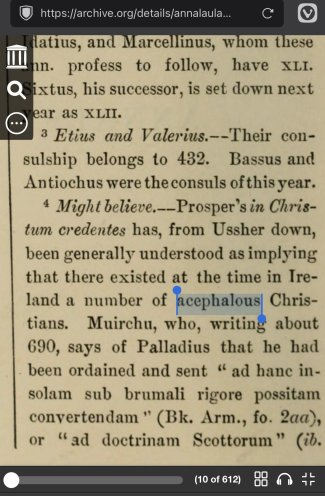Ben1445
Well-Known Member
All churches is also an impossibility to prove and reasonably should not be claimed.Paul was not finding blame in Peters teaching, but his behaviour. Which has no bearing on Peters infallible guidance on teaching.
If you asked for something reasonable, there is plenty of surviving historical evidence for what I am telling you.
You set your standard of evidence impossibly high, so that you can safely ignore the actual evidence. Ignoring this still leaves you ignorant.
“Since, however, it would be very tedious, in such a volume as this, to reckon up the successions of all the Churches, we do put to confusion all those who, in whatever manner, whether by an evil self-pleasing, by vainglory, or by blindness and perverse opinion, assemble in unauthorized meetings; [we do this, I say,] by indicating that tradition derived from the apostles, of the very great, the very ancient, and universally known Church founded and organized at Rome by the two most glorious apostles, Peter and Paul; as also [by pointing out] the faith preached to men, which comes down to our time by means of the successions of the bishops. For it is a matter of necessity that every Church should agree with this Church, on account of its pre- eminent authority, that is, the faithful everywhere, inasmuch as the apostolical tradition has been preserved continuously by those [faithful men] who exist everywhere.” Irenaeus, Against Heresies, 3:3:2 (A.D. 180).
“And he says to him again after the resurrection, ‘Feed my sheep.’ It is on him that he builds the Church, and to him that he entrusts the sheep to feed. And although he assigns a like power to all the apostles, yet he founded a single Chair, thus establishing by his own authority the source and hallmark of the (Church’s) oneness. No doubt the others were all that Peter was, but a primacy is given to Peter, and it is (thus) made clear that there is but one flock which is to be fed by all the apostles in common accord. If a man does not hold fast to this oneness of Peter, does he imagine that he still holds the faith? If he deserts the Chair of Peter upon whom the Church was built, has he still confidence that he is in the Church? This unity firmly should we hold and maintain, especially we bishops, presiding in the Church, in order that we may approve the episcopate itself to be the one and undivided.” Cyprian, The Unity of the Church, 4-5 (A.D. 251-256).
Can you show me Scripture that says all churches have to agree with the Catholic Church. Irenaeus is not an authority that I recognize and follow. I am not saying erase his work. But his words are not God’s words. They are his own.

